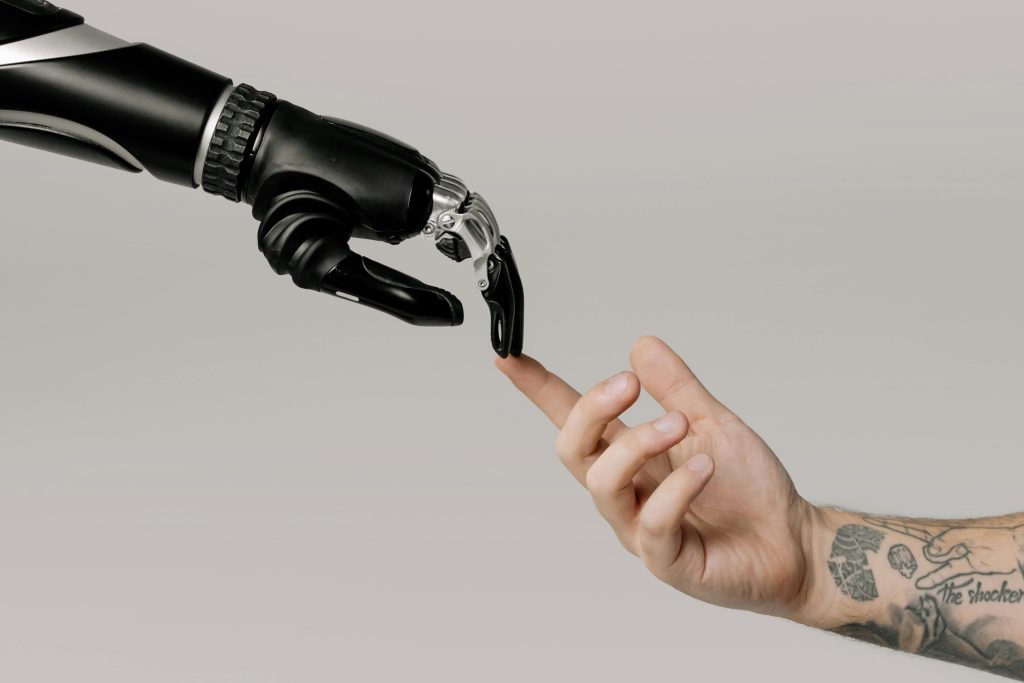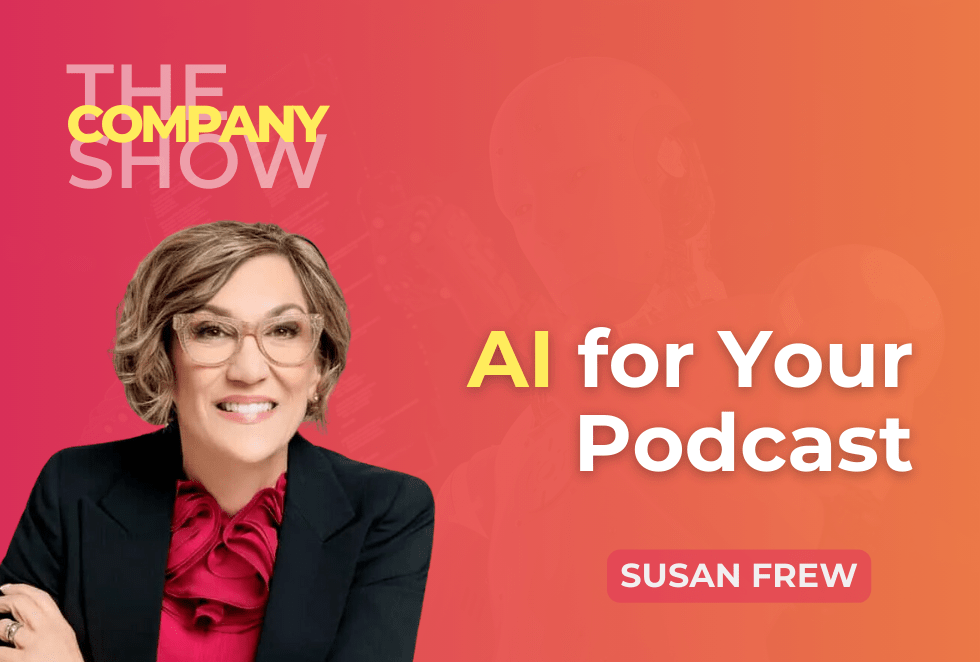AI is becoming a reality for many businesses, and podcasting is no different.
There are a plethora of different ways that a company can use AI to alter the way they produce their show — some good and some bad. Some trying to be good, and others… not.
I have mixed feelings about AI – we’ve had mixed results using it at One Stone Creative, and mixed more on the negative than the positive. We do most of our work by digital hand and only use AI in a few small ways for certain episodes.
What works for our company doesn’t work for every company, however, AI might be a good help to you in a number of ways. Whether you want to include AI Tools and software in your processes or keep doing things the old-fashioned way, it’s important to know what’s available.
I’m joined today by Susan Frew, who is, fairly, called your tour guide through the world of AI. She has made amazing strides using AI to improve the finances of her own business and has spent the last two years learning as much as she can about the different tools available to help business owners be more profitable using this new technology.
We’re going to be talking about how she is using AI to support her own podcast, digging into why we’re not, when you shouldn’t let AI take the lead, and some general discussion about what the new industry means for the world, for privacy and for the future of podcasting.
I found this really interesting, and I think you will too. Here’s the conversation:
Tune in to the full episode to learn about:
- How Susan Frew Got Into AI
- Susan’s AI-Powered Podcast Production
- Susan’s Podcasting for Business Goals
- AI and Content Creation
- Letting AI Use Your Voice
- What You Shouldn’t Use AI For
- Balancing AI and Human Workflows
- AI, Intellectual Property, and Privacy
- AI’s Evolution and Environmental Impact
- The Future of Podcasting and Human Connection
My book, Podcasting for Business is now available on Amazon — learn more about it here.
How Susan Frew Got Into AI

Susan: “My background is in tech, somewhat. I began in wireless technology in the early nineties in New York City, ended up in Denver, and then I was out of the United States for two years, helping to launch some new markets.
When I came back, I started coaching and speaking at a radio show on ESPN, and through that my husband and I got married. We started a plumbing and heating company and I have always loved my speaking, so I’ve been a keynote speaker for a long time.
But when AI really started roaring its head two years ago, I jokingly say, which really isn’t that much of a joke, that I’ve been sitting in this chair for two years learning, and now I speak to people all over on the topic of AI and how they can use it in their business to save money, be more efficient, et cetera.”
Compete on Awesome with AI
Susan: “I have a book that I wrote called Compete on Awesome Not on Price, which I was super lucky that I got that title, but I just sort of spun it a little bit and I said, Compete on Awesome with AI. Because our plumbing company, we were trying to downsize it. My husband had become sick and we needed to save money and super fast, or we were going down and we were able to use AI to save $170,000 in our budget.
And that’s when I speak to people about real-life applications. You want to save money on this? Use this tool. You want to create great content, use that tool. I jokingly say I’m the tour guide to AI.
Megan: “I love that. That’s a great use case for a podcast too. The perfect format to give those case studies, those examples, and those real-life situations where people could be using a new tool.
So Susan, with this new podcast that you’ve developed, obviously you are using AI in some pretty cool and creative ways to work on it. We talked a little bit in the pre-show. You’ve got some script generation assistance, you’ve got some AI tools that are helping you with the editing.”
Susan’s AI-Powered Podcast Production
Susan: “My plan is on Wednesdays, that’s going to be production day. That is the day that I create my newsletter. It’s the day I’m going to record my podcast. It’s the day I get all my content out, and that’s between 10 and 12 Mountain Time.
But prior to that, I have ideas that — we all have ideas as we’re going through our week and we’re like, oh, I’m going to do a show, or a podcast or a newsletter about that — I take my microphone and I transcribe by voice my ideas of a good podcast and a good newsletter that I want to put together that week, and then I put it into AI.
I use an AI called ChatHub. Included in ChatHub is 10 to 15 (it seems like always growing) different types of large language model AI tools, and once I put my ideas in there, cut and paste them from another app.
A lot of time I use notes on my phone if I’m just walking or I can do it in a Google Doc, however, and then I pop it into ChatGPT, or the ChatHub, all of the different programs at once. And I tell it to create for me a framework for my newsletter and for my podcast. And then it will do the newsletter, it will line it all out.
Then it will do the podcast script outline and then that is what I will use to record the podcast and I record on Zoom. The reason I do that, it’s just easier for me because I do travel a lot and I know that that’s something I always have with me and I now travel with my microphone and my headphones so it sounds the same wherever I am, it doesn’t really matter.
And this background behind me, I don’t put this in the episode. And the reason is it’s because I travel and I don’t want to have to recreate that. So I will record it wherever I am, just regular and then Descript will take the background off so it removes the background, and then I can put my show background on it.
Otherwise, if you’re recording on Zoom, then you look really weird when you have that virtual background. So this eliminates that. And then Descript will go through the entire recording once you put it in there from Zoom, and then you can edit it in there yourself.”
A Little Bit About Descript
Megan: “For those, listening, if you’re not familiar with Descript, it is a visual editor essentially.
So you can get the transcript of a piece of audio or video and then edit as you would in a word processor to alter the audio and video watch out for those choppy cuts. Descript still has choppy cups, everybody.”
Susan: “Yes, I did that. My first one sounded really bad. Oh my gosh. So now I’ve learned to pause too.
I’m from New Jersey, I talk really fast. I had to really pace myself not to do that so that I can breathe and then there’s a place to edit without it sounding weird.”
Megan: “Exactly. And that’s a really great point too, is that AI, like any other computer, it’s garbage in, garbage out.
You’ve have to make sure that you’re giving it really good stuff to work with so that you can get the outputs that you can use.”
Susan’s Podcasting for Business Goals

Susan: “My goals are really just one-dimensional. I want to be everyone’s tour guide to AI. That is my happy place. I love teaching people how to use new things — look at what I found out, and this could make your life easier. So that is my happy place and that’s what I want to continue doing.
And speaking to people about things that I found, ideas, ways to shorten their sales process, whatever it is, and getting the content out there and making people not be afraid of the AI.”
What Success Looks for Susan’s Podcast
Susan: “If I’m getting booked for speaking engagements. That is really the one key performance indicator. So if anybody’s calling me for paid speaking engagements, then it’s working, otherwise, it’s not”
Megan: “Beautiful. And I hope that wasn’t too much of a supple. I know you’ve got a copy of Podcasting for Business.”
Susan: “Yeah, I didn’t want to just do it to do it. And years ago I had a show on ESPN, which was great. It was prestigious. I had a coaching business at the time, so it was great. I got a lot of business that way.
But back then, so this is 2007, 2008 — If I had a guest not show up, we were in trouble because then what? And you’re sitting there and you don’t have any idea what you’re going to talk about because you’re going to interview this person. And that is why I resisted doing the podcast as long as I have because I didn’t want to go through that”
Megan: “Understandable concern. Guest wrangling is a whole field in and of itself.”
AI and Content Creation
Susan: “I use Podbean, and I don’t know if we would consider that to be AI. I think that’s just a way to really get your message out there. But I did use AI to create all of my graphics and my logos through a camera, so I definitely use that.
I do write content and scripting through AI. Once again, it’s my voice in the AI and then I run it through, and that is what. I don’t just go take what’s in AI and say it I, it needs to be me, and believe it or not, and many of your listeners might be surprised by this, I brought this up to an audience yesterday and they were shocked.
There are things now called AI humanizers, so if you think your email templates or your newsletter or whatever sounds really robotic, you can pop it into the Humanizer, and the Humanizer will humanize it and give it back to you.
You can also train your AI on your own style. I’m from New York and New Jersey. Short stories. Short bites. Not long, 1, 2, 3 — and that is how my AI responds.”
Megan: “I’ve got such a wave of mixed feelings about the concept of an AI humanizer going through my body right now. But you used a term that I’d love you to clarify a little bit for those of us listening, because in podcasting when we say voice, we’re talking about what comes out of the throat.
That’s the main voice that we’re talking about, but I think you’re using it in terms of your syntax, your verbiage, and the different ways you would express something. So when you say you’re having AI use your voice, what does that mean and how does it work?”
Letting AI Use Your Voice
Susan: “ChatGPT, I have been using that for two years and I have the upgraded version.
If you have the upgraded version and you go into the right side, top right and there’s a little drop down there. A lot of people don’t realize that it’s there, that is your account. You can then enter information about yourself that will get the AI to know you.
You can talk about how you communicate. Do you use long sentences, or short sentences? Do you speak with an accent? Do you, make long paragraphs? Are there certain things that you would never say? What part of the world are you from? You can add all of those things in there about yourself, and it will then start emulating you more accurately instead of sounding so robotic.
I still have that challenge a little bit because I make a lot of avatars, which is also a controversial topic.
I love my avatars. Not everyone loves them, but you have to train them as well. Just think of it as AI is the smartest assistant you have ever had, and they just have capacity more than any other assistant. However, they must be trained, otherwise they’re going to go off and do what they want to do and it’s not going to work for you.”
What You Shouldn’t Use AI For

Susan: “There is a podcast here that I follow, name will not be mentioned here. I admire him. He puts out a ton of content that I use and he does a daily show. He’s now starting to travel a lot and he also got sick, so he used an ElevenLabs to do his daily show.
I know that there’s some people that are doing that, and I know that there’s podcasting with all robotics right now. I don’t know how I feel about that because I want to hear from a person who’s smart and has great ideas and is a thought leader. I don’t want to hear from the thought leaders created AI content.
I do get it. So what this guy did, and this is available to a lot of people, they use a program called ElevenLabs, that’s probably the best one. They type their script in there and then ElevenLabs reads it.”
Megan: “I’ve tested that particular company a little bit, and I remember, I think it was their disclaimer of some kind. I can’t remember where it was in the process, but you had to basically enter your name and say, I agree that once this is created, the voice may be used in ways that I cannot foresee, and that I’m just okay with that.
Absolutely not. Under no circumstances is that okay. But I guess the temptation is there. And it’s so real because. Especially those of us who are maybe more fluent writers than speakers. It’s tempting to be able to use that as a method to generate content.”
Susan: “If you’re sick, like the way he used it, he was sick and he had laryngitis and he couldn’t do his show. So he just had ElevenLabs do his show.”
Balancing AI and Human Workflows
Megan: “I would love to take the opportunity of having you as the expert here on the show, because I remember we chatted a little bit about this before and the case we had here at One Stone Creative is that we were using for a little while an AI show notes writer. We tested all of them, we chose the one that seemed to be the best, and we used it to write the first drafts of the show notes that we were creating.
And by the time we had experimented with it for about a quarter, we discovered it was actually much more expensive to use AI than it was to just have a human do it right the first time because we had to invest so much extra in QA and it was good enough that the mistakes it made were hard to catch, so QA took a lot longer than it did before.
In your opinion, knowing what you know about AI and the tools and how people use them. Is this just the nature of the beast for this type of work? Or was this like user error on our part?
What do you think? And if you can armchair diagnose the situation?”
Susan: “Well, I think that the AI is consistently evolving all the time, every day something new is there. Every day there’s more than one podcaster out there that does a daily show and they have content, which is mind-blowing to me — one news cycle that this person has 30 minutes to talk about, which is really crazy. So I do think it’s getting better.
Right now with the ChatHub, it’s 19.99 a month, and I have all the different AIs, but then I do pay for Descript so that could be considered an AI. I’m always monitoring my subscription.”
Megan: “Yeah. You have to keep an eye on they pile up fast.”
Susan: “I know, I just went through and did a cleanup yesterday, I was like, what is that? I still have a few of them that I don’t know what they are because they go by all these different names as well. They have all these different apps out there.
I don’t delegate this part of my work very often, so I just use the AI myself, and I know if that doesn’t sound like me or that’s not right, I don’t like it, it’s going. So maybe that’s the part, I don’t know.”
Megan: I think part of the issue was, and I think this might be a function of being an agency, is that we have a wide variety of different shows that have a wide variety of different voices.
And for a human to be able to go, oh yeah, okay, this is for this show and I’m going to write like this and I’m going to follow this. That’s maybe a lot harder for the machine to do.
It was really interesting to see the type of mistakes that we made because it would be a misattributed quote or maybe this person’s the wrong title at this company. Very small stuff, minor stuff. Super embarrassing to send to a client stuff. I thought it was interesting and I’m glad to get your insight or opinion as to what might have been happening there.
And for now, we’re a human working company, maybe just until the next iteration comes along, and of course, as long as there are really good, I guess, privacy and IP protections in place.
AI and Intellectual Property

Megan: “This is maybe a little bit more on the controversial end because not everything about AI is rosy and sunny, but what would you say to you, or should we have any concerns about the way the information that we’re giving to these AIs to generate some material for us can be used? Can they be used by others?
And is there a concern about copyright and intellectual property? What are you seeing going on right now?
Susan: “I’ll tell you an interesting story. So many people know that last week or so, Oprah had a show. I actually did not go to an event that night because the way they put this show out, you had to watch it right then and there, or you’re not going to be able to get it until the next day, and then you have to subscribe to Hulu.
I didn’t want to do that, so I stayed home and I watched the show and I thought it would be fun to create a Kumbaya picture of Oprah and Mark Zuckerberg and Sam Altman and Bill Gates. Sam Altman is the CEO and founder of Open AI at ChatGPT. So I thought it would be fun to like get a picture of them.
I went through ChatGPT, I went to Claude, which is owned by Anthropic. I went to Gemini which is owned by Google. I went to Llama, which is owned by Meta, and Perplexity, and none of them would do it. They wouldn’t do it. They would not create a real person for me.
So I went to X and I have the upgraded version of X because X has no guardrails — zero, none, nada. I don’t think we’re surprised by that. So I spoke to X and I said, may I please have a picture of Oprah and Mark Zuckerberg? And boom, instant, it created it.”
Megan: “I don’t think I even know it had an LLM or a generative function. I haven’t used it in a couple of years.”
Elon Musk’s Grok AI
Susan: “So there’s two different Groks, so the Grok that’s on Twitter that Elon Musk owns.
Just a tiny diversion to history here, Elon Musk was part of OpenAI, ChatGPT, and ChatGPT as it is right now, OpenAI is a nonprofit, weirdly. It’s worth a gazillion dollars, but it’s a nonprofit.
And so Elon Musk wasn’t happy with what was going on there for whatever reason and he took his ball and bat and went home and he started his own company called Grok. There’s also another Grok, which does something else.
Everyone was wondering, what is this Grok going to do? It’s not doing anything. They’re far behind. We all know that Apple Llama and Google were also behind too, and it was crazy because all of a sudden it’s live and it’s phenomenal and Elon Musk has said in interviews that he has the largest supercomputer in the world, and that’s what runs AI.
Big giant computers that suck up a ton of energy and a lot of big, giant chips, and that’s what makes it. So you couldn’t use Grok unless you paid the $22 a month to X, formerly known as Twitter in order to get access to that button.
But it has no guardrails. It has no limits. If you asked ChatGPT, and I did this earlier, I asked it a sensitive legal question and it wouldn’t answer me. It said, I’m sorry, I do not provide information like that. Did it to Grok. Boom. There it was. And it created the Oprah picture in less than 30 seconds.”
Copyright, Privacy, and AI
Megan: “For someone who’s worried about their image being used without their consent in that way, or protecting — I’ve written Podcasting for Business and I’ve made some effort to try and keep most of it [safe] because I don’t want my proprietary content being used without my permission or being compensated.
What do you think about people who are more concerned about sort of protecting the digital hollow, their presence online in that way? Is there a way to do it or were we at the point where we just need to throw up our hands and say, it’s all out there, abandon hope. Just go with it.
What do you think?”
Susan: “If you have ever logged into something that says, log in with your Google account right here, or log in with Facebook here, you’re out of luck already.
That is why when I use this ChatHub program that’s got all the different AIs on one board, Gemini, which is Google, and Lama, which is Facebook, have the best results because they have the most data internally.”
Megan: “The question I’m really asking is, is that okay? I mean, I think about that and I’m like, I don’t feel super okay with getting results based off the work that someone has done and they didn’t give permission or get compensated for it. I don’t feel great about that.”
Susan: “A lot of people don’t, and that’s the big controversy and that question that you came up with earlier about ElevenLabs or whatever asking you for permission, I don’t really know how you’re going to protect that.
I feel like what you see out there is a merge and that gets around all the copyright rules. So everything’s all mushed together. Your idea, my idea, everyone’s idea. Put it in the snowball and then that’s it.
I’ve been, playing with Runway. Runway is a really high-end image generation program, which I love, but it takes a lot of time. It’s a giant time suck for those of us with ADHD. I just went down the rabbit hole earlier with it, but where are all those images coming from?
I spoke to it and I said I wanted elephants to go in a circle, a moving circle around a woman in a field, and you know, where did that woman come from? She came from somewhere but as we get closer and closer to the AI thinking for itself, we’re going to have more and more of that.”
Megan: “I guess, it’s part of the big conversation we’re going to be having, right? It’ll be interesting to see because I know there are a number of lawsuits going on right now, trying to sort out this copyright and this attribution issue and the privacy issue.
And it’s certainly a whole new frontier of tech that we need to be thinking about.”
Exploring the Evolution of Artificial Intelligence

Susan: “AI is learning from itself.
Here’s a quick example. I like to go thrift store shopping. Most people know me do, and I created a GPT that you can go thrift store shopping with. You scan the item and the price tag and it will tell you if it’s a good deal or not.
Super fun. I’ve been giving these little cards out to folks and letting my friends try them because I want to see how they work and see how it performs over time and I want to build an app with it as well. And I gave it to Dress for Success, which is a worldwide company where women donate suits and things for people who want to go on job interviews.
So I gave them the card because who better than Dress for Success, who has mountains of clothes coming in and they have no idea what they’re worth. Well, they discovered that it can tell you if an item is real or fake. So they had this Versace scarf and they’re like, we thought it was fake. Who would donate a Versace scarf?
Well, the app said it was real. I was like, okay, please know that I did not train it on that. If that is in fact what it said, I don’t know if that’s right. Well, they checked several other sources and it was correct. So it taught itself how to do that.”
Megan: “That wave of mixed emotions is back.
I’ve never been the fastest tech adopter in the world, but like I’ve never felt more like a Luddite in my life than in the last year to 18 months when all of these new AI tools have been developing (sidebar, they’re a deeply misunderstood historical movement. I’m just going to put that out there.)”
AI’s Environmental Impact
Susan: “From what I understand, there are a lot of computer fields in other countries that are more sustainable using windmills and wind technology and solar and all that.
That’s what’s going to have to happen because they suck up a ton of energy. And it’s interesting because when you think of a computer chip, don’t you think of something really small, like something that is used to put in your camera?
These AI chips that come from Nvidia, or if you have Nvidia stock, you’re probably very happy — they’re the size of a Volkswagen. Look, these things are huge. They look like those old mainframe computers. And you need many of them.
Weirdly, for some bizarre reason, only known to those in the know, Facebook had a whole bunch of them. Meta had these Nvidia chips somewhere for something, and now all of a sudden they are going to be pulling ahead.
And I’ll tell you, I’ve been playing with this ChatHub looking at the six to eight different AI responses for the last week, and Llama, which has Meta is the bomb. Its responses are so much better than all the other ones.”
AI: The Future of Podcasting and Human Connection
Megan: “If you’re willing to gaze into the imaginary crystal ball before us.
What do you think is coming for AI? And I’m going to ask you if you to narrow it down specifically for podcasting. Now that you’ve got a show, you know, your guest on the show, what do you think AI has in store for the future of podcasting?”
Susan: “I think that people are going to continue to create these artificial shows. I think that the human race needs to put a stake in the ground and say no. Because I believe the antithesis or the polar opposite of the AI is human connection.
So if we can delegate a whole bunch of crap that we don’t want to do to AI and make our lives easier, faster, better, more lucrative, whatever it is, then we have more time to spend connecting like this and getting to know each other and understanding who we are and how we connect and all of those things.
If you’re listening to AI podcasts, you’re not going to have that. You’re just going to have more robots. So if you would like to be a loner without any real connection to real people, then by all means I think you should listen to them. But otherwise, if things are driven by consumer behavior, compensation drives behavior in every way, shape, or form — so don’t support it.
You do have a choice to say, I want to listen to real people with real ideas. We all just need to say no.”
Megan: “Love that. I’ll add a prediction to yours. I think better audio editing engines are probably going to be coming out in the next little while. So you can take a raw audio and you can put it into an engine and say, make this sound like an NPR episode, or make this sound like a Radio Lab episode.
I feel that’s coming and I don’t think that’s necessarily good. A lot of art and a lot of consideration goes into that. So it’s very interesting on the one hand, it democratizes that level of production, but on the other, it cuts out all the people who actually do the work.
So I like your stance on just saying no.”
Susan: “I created a song for myself the other day in 10 solid minutes, I went and got the lyrics and I popped it into Suno and I had it make me a song. Now the song is two and a half minutes long, so it serves as walkup music if I’m doing a keynote and then it serves as podcast intro music, which is what I need to put together next here.
It’s really cool and I have absolutely zero musical talent. I’m tone deaf.”
Connect with Susan Frew

Susan: “If you are a person who hires speakers, I’m definitely completely interested in speaking with you. Or if you would like me to be on your podcast, I would love that.
You can find me anywhere at susanfrewspeaks — LinkedIn, X, just don’t ask for it to make an image of me. Instagram, Facebook, all the socials, I’m out there all the time.
My website: susanfrewspeaks.com”
Final Thoughts
Listening back, I can see I do have some really serious reservations about Artificial Intelligence – the impact it’s making on privacy, fair use and copyright, and the environmental issues.
Deep down, I also feel there is value in doing things yourself, in being involved in processes, and maybe, if that means it takes a little longer or we do a little less – I’m okay with that.
My way is not everyone’s way, however, and experts like Susan are really empowering people and companies to do more with what they have. I enjoyed hearing her ideas about how we should think about AI and the benefits that can be gained from it – and that thrifting GPT is just cool.
When you’re thinking about employing AI tools in your process, remember not to sacrifice quality for speed.
Depending on the goals of your show, you might need to put more or less human power into areas like planning production, scripting, and promotional materials – be intentional about the work you do and the tools you use – it makes a difference. And, as Susan said, when it comes to 100% AI content – just say no! No one wants to listen to that.
Check out Susan’s work – and her video avatar! – at SusanFrewSpeaks.com.
Podcasting for Business – The Book
In case you haven’t gotten it yet, my book Podcasting for Business: How to Create a Show That Makes a Bottom Line Difference for Your Company, is available now!
If you think your podcast should be a little bit more profitable (or a lot more profitable), I highly recommend that you check it out.
There’s going to be some great information there for you.
Podcasting for Business Conference 2024
We’ve got over a dozen expert presentations, expert Q&A, panel discussions, workshops, and lots and lots of networking opportunities.
It’s happening from November 13th to 15th this year. Learn more about PFBCon here.
Be A Guest on The Company Show
Do you have a podcast that’s making a major difference in your business or know one that is? Fill out this contact form and let us know about it.
We’d love to have you here for an episode like this one!
Need A Podcast?
As always, this is Megan Dougherty, and The Company Show was made possible by the team at One Stone Creative.
If you know a business owner that you think should have a podcast, do us a favor and send them to podcastingforbusiness.com!
Key Quotes
“I think that people are going to continue to create these artificial shows. I think that the human race needs to put a stake in the ground and say no. Because I believe the antithesis or the polar opposite of the AI is human connection.” – Susan Frew
Resources
One Stone Creative | LinkedIn | Twitter | Facebook | Instagram
- Pre-order the book, Podcasting for Business
- Pre-ordering will get you a free ticket to PFBCon 2024
Learn about what other business podcasters are doing:
Susan Frew | Website | LinkedIn | Instagram | Facebook

